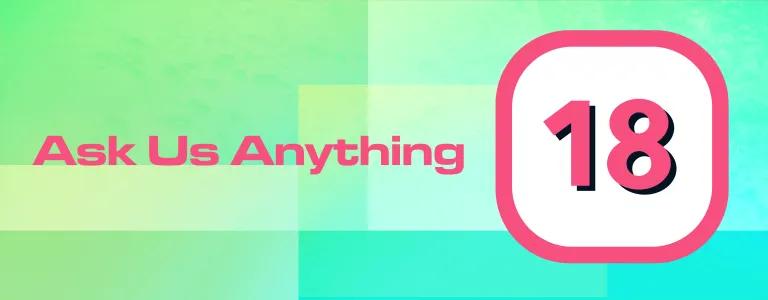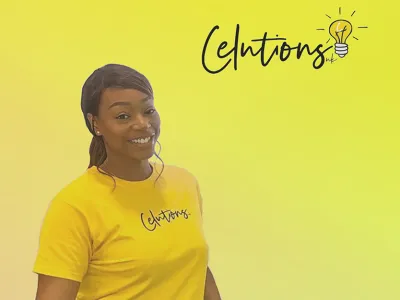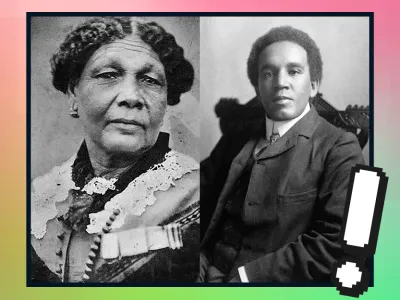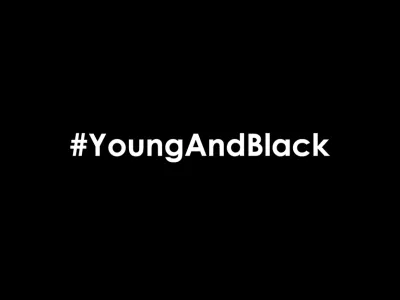
Your Questions Answered: Black Culture And Identity In The Uk
Include this article in your Skills Builder Journal. It could help you develop... 

In our second Ask Us Anything of the series, we teamed up with our pals at Ting - a social enterprise dedicated to increasing diversity and inclusion within the creative industries - to answer your questions on Black Culture and Identity in the UK. We put together a list of the top questions you guys asked and sent them over for their responses. Here’s what they had to say…
Isn't it racist in itself that only black people can say the n-word?
This is a question that tends to confuse a lot of people, but racism exists as a result of an unfair power dynamic, which places white people in society in a position of power simply because of skin colour and not individual merit. This means that when this word has historically been used by non Black people it has been used as a means to cause severe distress and has also been life threatening for Black people (see the case of Emmett Till). In 2020 as society tries to heal from racism, it means we need to be mindful of why we use certain words and be aware of the power dynamic that comes with that if you are white. African Americans adopted the word as a way to reclaim something that was used inhumanely against them, and it is now being adopted by Black British culture, although many Black people have their individual opinions on whether use of the word is appropriate or not.
Why do we have to have a specific month for Black history? Why can't we just have it included in a history month?
This is a brilliant question, and I'll start by saying the ideal scenario would be that Black history would be included in the British curriculum, throughout the year instead of having a month where we only focus on it. However unfortunately, Black Britons are rarely mentioned in history, which means that as a people, we have had to fight to prove that we have had a valuable contribution to the UK and the world, in regards to tech, art, fashion, inventions, culture etc. You may have heard the quote, 'there's two sides to every story,' well in this instance, Black History Month exists because it's important to include the narratives and perspectives from non white historians in order to get a full picture of historic events. For example, have you ever heard of the 1960's Bristol Bus boycott or the New Cross house fire in the 80's? These are just two pieces of history that are key parts of the fabric of this country that are not taught in school.
My boyfriend is Black and I don’t know how to talk to him about race because I'm not sure if it’s my place to speak on certain subjects that affect him. It’s so awks and I don’t even know where to begin.
Thank you for asking this question, there are probably many people that are in interracial relationships that are trying to navigate this issue. I often use the term 'silent assignment' which is when you make an effort to learn about something without announcing it, or reporting back to anyone. When it comes to educating yourself more on issues of race, you can do this independent of your BF, by reading, watching YouTube videos, and most importantly, listening to any Black people in your life when they speak about their experiences. You do not need to inform people that this is what you are doing, and the more you listen and learn, the more you will feel confident to engage in conversations about race. For your BF, maybe you can let him know that you are listening and learning, and that you want him to know that you do not want him to feel as though he cannot speak about race around you.
What's the difference between Black Lives Matter and All Lives Matter?
Another excellent question. The difference is ALL LIVES are not at risk because of the colour of their skin. Black people's lives, life chances, housing, access to unbiased healthcare, job prospects etc are all at risk. That's why Black Lives Matter exists, to highlight the many ways in which the system marginalises Black people.
I'm Black and proud but I don’t agree with some of the ideologies around BLM but I’m too scared to talk about it as I don’t want to be branded a sellout. How do I voice my views without offending anyone?
Great question! There is a perception that all Black people are the same, that we share the same views, opinions, personalities etc, which is not true. The honest truth is that you cannot try to not offend anyone, it's almost impossible to manage the reactions of other people, and so the best thing you can do is to ensure that you are are respectful when you share your opinions and steer away from making inflammatory comments, or from conversations that you know may trigger you.
Are there Black museums?
There are a few places in the UK you can visit to find out more about Black history, one of which is the International Slavery museum in Liverpool. However, it's important that you learn about what Black people did before slavery too, as that's not where our history begins.
I’d protest but I'm scared because of corona. What can I do instead?
I love this question, because I also was unable to protest because of my anxiety. There are so many different ways you can mobilise, in an ecosystem of change there are many people doing many different things to create that change. Deepa Iyer created a map to articulate this and I have included a link for you to download here.
So I know I'm not racist but what's being anti-racist?
So the difference between being not racist vs being antiracist is this: being antiracist sends a clear signal to people you come into contact with that you are aware, reading, listening, and making changes based on your learnings when it comes to racism. It also lets people of colour know that you are willing and open to be educated, which puts you in a position of allyship. Stating that you are simply not racist suggests as though you are unwilling to learn about the nuances and deep dark nature of racism and the way in which it gets into every fibre of our society, because as a person who is not racist you don't need to do any more work. The distinction needed to be made because many white people had the idea that racism was simply ‘being mean’ to Black people, and by not being mean, they were not racist. Black people have long known that racism is a lot more complex than that, and so the term antiracism was coined.
How do I tell my parents that sometimes they say racist things?
A simple, 'Hey Dad/Mum, you're probably unaware but let me tell you how that was a bit racist' could work. However, it's key to note here that not all people feel comfortable confronting their parents as it may not be safe to do so. Please ensure that it is safe for you to have these conversations before you do.
Why do some Black people call older people not related to them aunty and uncle?
I love this question. It's a mark of respect for our elders. It's not deemed as respectful to call an adult by their first name.
Why's it a bad thing to say 'I don't see colour'?
Another great question. This is because the lives of people of colour are disproportionately affected as a result of systemic racism. Their lives are affected by the colour of their skin, which means that when people say that they don't see colour it becomes frustrating. It also plays a part in making our identities invisible, and therefore not acknowledging the pain caused by racism.
What's systemic racism?
Systemic comes from the word system. So systemic racism is racism that has been built into the systems in our society. For example, Black women are five times more likely to die in childbirth than white women. Or the fact that in 2019, there were four ‘stop and searches’ for every 1,000 white people, compared with 38 for every 1,000 Black people, which is crazy as Black people only make up 7% of the UK's population! Systemic racism means that Black people and other people of colour have an unfair chance in succeeding in society.
One of my teachers made a comment around my hair matching my attitude (I have pink hair). Another time I was told that I have an "attitude" even when I’m just being normal. How do I address microaggressions that I get at school?
Teachers unfortunately can be quite uneducated about these things, which can cause harm. If you feel safe to, you can approach your teacher to let them know that what they said made you feel uncomfortable. If not, make sure you make notes of these incidents so that once you have identified a member of staff that you trust you have evidence as proof.
I don’t fully get what white privilege is?
Such a common question. White privilege is a set of societal privileges that you gain simply by being white, not by individual merit. For example, not having to worry about any of the following; moving house and wondering if the new neighbours will like you because of the colour of your skin, travelling without worrying that the country you’re visiting is racist and you'll be placed in harm's way, or going for a job interview and questioning whether the person interviewing you has a disdain for your race. These are all things that people of colour think about on a second by second basis, especially those who live in majority white spaces. White privilege has nothing to do with being born poor, or not being middle or upper class, it exists to exemplify the way in which white people navigate society without having to think about how their skin colour is negatively affecting them.
How do I get people to stop pronouncing my name wrong without making it a big deal?
First of all, you, as well as every other human being on the planet deserve to be called by their name given at birth if they so wish to be. Western society has historically made a faff about being able to pronounce 'ethnic' names, which further dehumanises people and their cultural identities. Which is interesting as we are taught to comfortably pronounce names such as Tchaikovsky, or Stravinksy, the names of famous composers. You don't need to worry about making it a big thing. Having people respect your identity is important, and making the effort to pronounce a name is a mark of respect.
Since George Floyd's death it feels like more people want to understand the BLM movement. In my friendship group, it feels like I am expected to be a spokesperson for all Black people, how do I avoid this?
This is common. You can simply let them know that you do not wish to be the spokesperson for Black issues within your friendship group, and maybe refer them to a reading list for them to check out.
Should I be cancelling any friends that don’t seem to care about the Black experience or BLM?
Cancel culture is problematic as it doesn't create the space for people to learn and grow at their own rate. However, you are more than within your rights to socialise with people that share a similar mindset, viewpoints and opinions, so you can defo find new friends, but be mindful about using the word cancel. You may want to create healthy boundaries with them instead.
Half of my family is Black, from my mum’s side and after all these protests it's torn us apart as they believe they can't have nothing to do with us as we are white and we have privilege which I don't believe in. It’s difficult because I want my family back but they've walked away from us without reason. But I don't know why.
This is really difficult, and I just want to acknowledge your courage for asking the question. I don't have advice for this, instead I'd like to offer you another perspective. Children and young people are often unaware of the complex dynamics between the older members of their families. Things happen between adults and a lot tends to go unsaid, or unexplained, which can leave children in the dark and sometimes harbouring feelings of anger as they don't have enough information to form a balanced viewpoint. Unfortunately if the adults are unable to talk things through in an emotionally healthy and respectful way, then family members can become distant from one another. The commitment you can make to yourself, if you so wish, is to educate yourself on race issues, and to be open to a conversation with those family members should it arise in the future. None of what has already happened is your fault, but moving forward you can ensure by educating yourself and developing the courage to have tough conversations, you may be able to repair the relationship when you get older. I've also answered a question about white privilege above, check that out and see if it makes things any clearer. All the best.
Want to learn more? Why not check out our Five Must Read Books on Black History and Culture, take a look at the Black Figures Who Shaped British History, or Learn and Celebrate African and Caribbean Dance.




